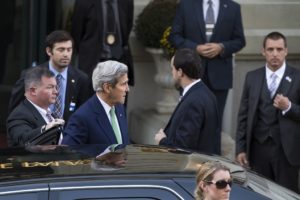
Back where they started, the United States, Russia and other international players in Syria’s civil war searched Saturday for a diplomatic process that could succeed where last month’s collapsed cease-fire failed. With the Syrian and Russian governments pressing an offensive against rebel-held parts of Aleppo, no one was predicting a quick breakthrough.
U.S. Secretary of State John Kerry is heading the new effort, joined by a familiar cast that includes Russian Foreign Minister Sergey Lavrov and the top diplomats of Saudi Arabia, Iran, Turkey, Qatar, Egypt and Jordan.
Days of deadly airstrikes in Aleppo prompted Kerry last month to end bilateral U.S.-Russian engagement on Syria, including discussions over a proposed military alliance against Islamic State and al-Qaida-linked militants in Syria. And last week he accused Russia of war crimes for targeting hospitals and civilian infrastructure in the Arab country.
Nevertheless, Kerry was reuniting with Lavrov at the lakeside Beau-Rivage Palace in Lausanne, even scheduling a one-on-one meeting with him before the larger gathering. U.S. hopes of any diplomatic progress appeared to rest squarely on Russia’s cooperation.
The conflict has killed as many as a half-million people since 2011, contributed to Europe’s worst refugee crisis since World War II, and allowed the Islamic State to carve out territory for itself and emerge as a global threat.
Residents of opposition-held eastern Aleppo have faced daily violence as Syrian President Bashar Assad’s government seeks to take full control of the country’s largest city. In an interview this week with a Russian media outlet, Assad said a military victory in Aleppo would provide the Syrian army a “springboard” for liberating other parts of the country.
Despite fiercely criticizing Syria and Russia, the United States doesn’t seem to have an answer.
President Barack Obama and the Pentagon have made clear their opposition to any U.S. military strikes against Assad’s military. The U.S. is uneasy with providing more advanced weaponry to the anti-Assad rebels because of their links to extremist groups. And sanctions on Moscow are seen as unlikely step, given their limited impact after Russia’s annexation of Ukraine’s Crimea territory in 2014 and the weak appetite among America’s European partners for such action.
With no apparent Plan B, Obama directed his national security team on Friday to renew diplomatic efforts to reduce the bloodshed in Syria. The White House said it hoped the larger discussions with Russia and other key governments would “encourage all sides to support a more durable and sustainable diminution of violence.”
Russia says it also wants a cease-fire, but describes the U.S. and its partners as the problem.
In an interview Friday with The Associated Press, Vitaly Churkin, Russia’s U.N. ambassador, said this weekend’s talks are focused on getting U.S.-backed, “moderate” opposition forces to break ranks with al-Qaida-linked fighters.
Given the collapse of several cease-fires in Syria in recent months, Washington doubts Moscow’s seriousness. And with rebel-held Aleppo poised to fall, potentially in a matter of weeks, there is deep skepticism that the Syrian and Russian governments want to stop the fighting just yet.
Saturday’s gathering also brings together many of the major protagonists in Yemen’s war, and discussions on that are likely.
An investigation team with the Saudi-led coalition said Saturday that wrong information led to the bombing of a packed funeral in Yemen’s capital last weekend that killed some 140 people and wounded more than 600.
The U.S., meanwhile, struck radar sites belonging to Yemen’s Iran-backed Houthis this week after a U.S. Navy Ship took fire from the rebels.